Are you struggling with budgeting? Feeling frustrated because you have no idea what you’re doing. Each month you’re either going over budget or (worse) not sticking to your budget at all!
I get it! And you’re not alone!
According to The Penny Hoarder, over half of Americans (55% to be exact) don’t budget their money.
Most people either think they don’t need one or have tried to budget, but it didn’t work out.
I spent years making budgets on a daily basis because I had no idea what I was doing! Seriously, every day I would write out a different budget and plan how to pay off my credit card debt. But I could never stick with it or make a dent in paying off my debt.
So, do you know what happened? I gave up! Which, of course, led to overspending, living paycheck to paycheck, and more debt.
Thankfully, we gave budgeting another try after going through Financial Peace University. It changed our lives!
We figured out how to create a successful budget, which completely changed our finances.
So if you’re feeling fed up with budgeting failure, keep reading for the most common reasons why budgets fail and how to get back on track.
Disclaimer: This post may contain affiliate links. This means I receive a small commission, at no extra cost, if you purchase using the links below. Please see my earnings disclaimer for more details.
Table of Contents
Why do budgets fail?
You may be wondering why your budgeting efforts aren’t working. Here are the 12 top reasons why budgets fail and the solutions to avoid these budgeting pitfalls.
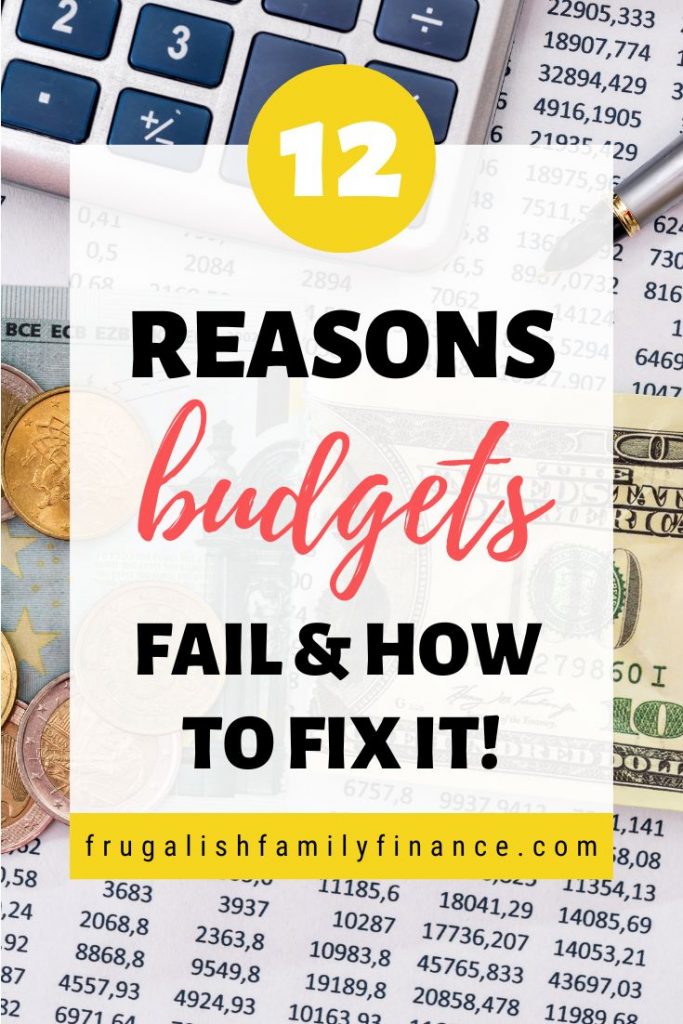
Your budget’s not realistic
An unrealistic budget is not going to work. Making budget cuts or setting spending limits you can’t stick with will cause you to go over budget, get frustrated, and quit.
I remember being extremely frustrated with our grocery budget. Money was tight, and I made a huge cut in grocery spending. I had good intentions, but my limit was way too restrictive and unrealistic for our family of 5.
This led to a lack of motivation, frustration, and ultimately overspending in other categories.
I realized I needed to reassess my spending and create a more realistic household budget.
How to avoid
Create a spending plan that is realistic for your lifestyle.
If you need to make cuts, choose things you can live without, like a gym membership, cable, or takeout.
Each month reassess your budget and spending habits. Did you have money left over at the end of the month? Adjust that budget category for the next month.
It’s better to have money left over in your budget than to come up short at the end of the month.
You’re not tracking your spending
Budgeting and tracking your spending go hand in hand.
You won’t know if you’re sticking to your budget if you don’t track your spending. Furthermore, not keeping track of your spending can lead to overspending and debt.
How to avoid
You have to track every purchase to know how much money is left in your budget.
The best way is to find a tracking system that will help keep you consistent.
- Cash envelopes
- Pencil and paper
- Spreadsheets
- A budgeting app
It’s easiest to track right after you spend, so you don’t forget. But you can also pick certain days to track all of your spendings.
Put a reminder in your phone to track at the end of the day or every other day, like Tuesday, Thursday, and Saturday, so you get in the habit of doing it.
Related: 12 Important Reasons And Benefits Of Tracking Your Expenses
You don’t know your spending triggers
A spending trigger is anything that tempts you to spend money. This can be any situation, emotion, person, or place that causes you to spend money.
If you’re unaware of what triggers your spending, you won’t be able to control it. Which will result in overspending and not being able to stay on budget.
How to avoid
You need to identify your spending triggers. To do this, look back at a couple of months of bank statements and categorize your spending.
Are you a busy mom who often runs out of time to make dinner, forcing you to run through the drive-thru? Try meal planning quick and easy meals that you can prep ahead of time or freeze to help eliminate fast food spending.
Do you enjoy hanging out with friends, but it often leads to spending money on entertainment, food, or drinks? Limit your outings or invite friends for a game night or potluck.
If you’re an emotional spender or spend out of boredom, try to replace those emotions with something productive. Try journaling, reading, a hobby, or a side hustle instead of shopping.
Maybe you’re not very good at sticking to your grocery list and making too many impulse purchases. Try grocery pick up. This will help you stick to your list and eliminate overspending.
You don’t have goals
Goals motivate you to stay on track with your budget and manage your finances. If you don’t have goals (or have unrealistic goals) for your money, the plan for it will fail.
How to Avoid
You want to set SMART savings goals to create realistic short and long-term goals that will motivate you to stay on budget.
What are SMART goals?
- Specific: Clear and specific.
- Measurable: How will you measure progress?
- Achievable: Be sure it’s possible to do it within a specific timeframe.
- Relevant: This should align with your values and be within reach.
- Time-bound: Have a clearly defined deadline with a start and target end date.
For example, here is one of our long-term financial goals using the SMART goals method.
- Specific: We want to save money for our children’s education.
- Measurable: We will save $3,000 per child ($9,000 total) each year and put it into an education savings fund.
- Achievable: We can achieve this using our education sinking fund and tax return.
- Relevant: We will save $750 per month and use our tax return until we have $9,000 to deposit as a lump sum into the education funds.
- Time-bound: We will do this annually until the children go to college or a trade school.
You’re not working together
Finances can be the cause of many relationship arguments. Budgeting can ease the financial stress in your relationship.
But you have to get on the same page with your spouse about budgeting and your overall finances.
You can live by your budget all you want, but if your partner isn’t, it just won’t work. You can’t control another person’s spending.
How to Avoid
The best thing my husband and I did was take a financial course (Financial Peace University) to help us learn to budget and help us get on the same page.
If your spouse is resistant, talk with them about why. They may think it’s too restrictive or have money issues that need to be discussed first.
Some tips to get your spouse on board with budgeting:
- Discuss your financial goals.
- Have budget meetings on a monthly basis to discuss your finances together.
- Make sure to budget fun money so your budget doesn’t seem too restrictive.
Related:
Dave Ramsey’s 7 Life-Changing Financial Baby Steps
Your income is not enough
If your expenses are higher than your income, that’s an obvious problem and why your budget won’t work.
There are two reasons for your income not covering your expenses.
- You’re spending too much on things you don’t need.
- You need to make more money.
How to Avoid
You need to audit your budget. If you’re overspending, you need to figure out where to decrease your spending. Usually, the fun stuff is where your budget goes astray.
If you’ve made all the budget cuts you can, then you need to increase your income. To do this, you could consider picking up some odd jobs or selling unwanted clutter around your house.
But, if this is a long-term issue, you may need to look for a higher-paying job, pick up extra shifts, a second job, or a side hustle to increase your cash flow.
Related:
Turn Clutter into Cash: How to Declutter and Make Money
Ultimate Guide for How to Get Sales on Poshmark in 2023
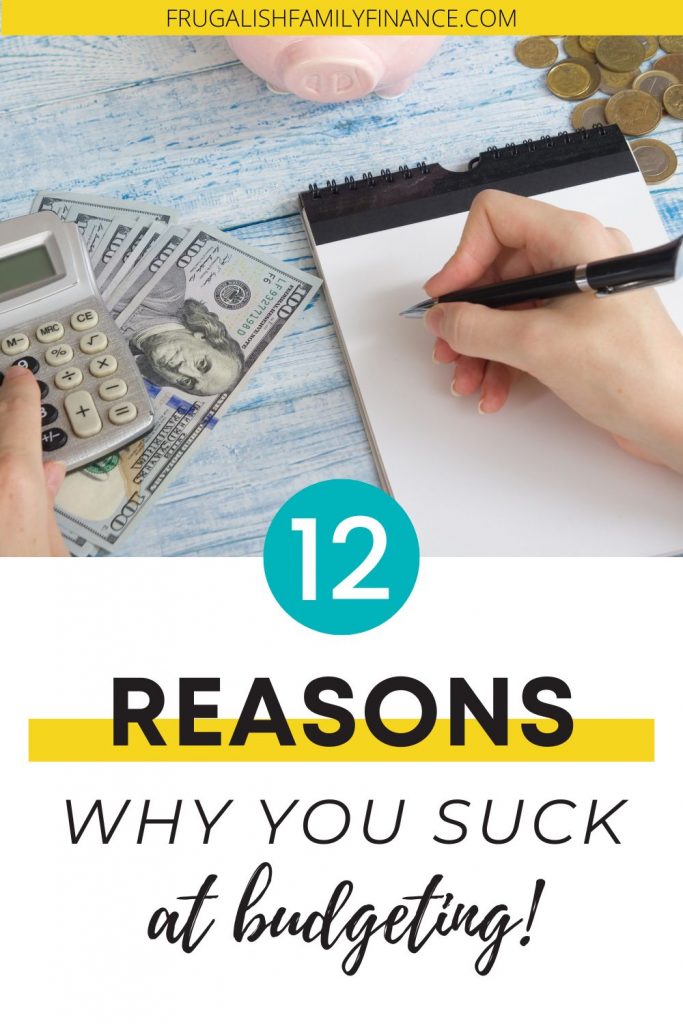
You’re not adjusting your budget
If you are not adjusting your budget each month, this could cause significant problems. Each month is different, so you should be accounting for that.
How to Avoid
To help make your budgeting quicker and easier each month, keep a list of all your reoccurring fixed and variable monthly expenses. Also, keep on hand any annual and irregular expenses you need to remember to budget for. I keep a spreadsheet of all expenses that aren’t paid on a regular basis.
When creating your monthly budget, start brainstorming a couple of days prior for irregular expenses you may need to budget for.
Don’t forget to add a miscellaneous section to your budget categories for any surprise expenses that pop up or you may have forgotten. Budgeting $50-$100 for miscellaneous things will keep you from going over budget.
You don’t have an emergency fund
Not having an emergency fund is a big issue. If you don’t have money set aside for unexpected expenses, something as simple as a couple hundred dollars for a car repair can put you over budget and possibly into debt.
How to Avoid
Having at least a $1000 starter emergency fund will keep you from going over budget and cover any minor emergencies that pop up. Ideally, you want 3-6 months of bare-bones budget expenses saved for emergency savings.
Check out my emergency fund challenge printable for realistic ways to save $1000 in 30 days.
You have a toxic money mindset
A money mindset is your attitude toward money and how you handle your finances.
A toxic money mindset leads to frivolous buys and constant overspending, ultimately leading to debt and financial stress.
I used to have a bad habit of comparing my life to others. This led to spending money I didn’t have to keep up with people from social media I didn’t even know. And, of course, this led to a crazy amount of debt I couldn’t handle.
Toxic money mindsets like this are way too common and are wreaking havoc on our finances.
How to Avoid
You have to change your money mindset!
- Figure out why you spend the way you spend. Where do your thoughts about money come from?
- Stop using credit cards to pay for things you can’t afford and take control of your debt.
- Learn to be content with what you have. If you’re always wanting more, you’ll never be satisfied.
Most times, we spend money for the wrong reasons. So, it helps to question your purchases and if you really need them.
A good rule of thumb for purchases over $100 is to think about it for 24 hours before making the purchase. This will help you determine if it was just an impulse or an actual want or need.
Questioning your purchases will help you to be more intentional with your spending and eliminate buyer’s remorse and overspending.
Related:
5 Secrets To Master Your Money Mindset
How to Slay Your Debt Using the Debt Snowball
How to Minimize Your Life and Maximize Your Happiness
No emotional attachment to money
Think about times when you have paid cash for something versus when you’ve used a debit or credit card.
Can you tell the difference? Did it seem more painful when paying with cash?
It should have.
According to Scott Rick, Ph.D., in an article for Psychology Today, he states, “it is less psychologically painful to swipe a credit card than to physically hand over cash.”
In this same article, Dr. Rick writes, “Credit not only helps to reduce the sting of payment, but there is some evidence that it also stimulates desire.”
I know when I use a card, I have no emotional connection to my money. Honestly, I am prone to spending more when I use a card unless I have a list and know my spending limit.
How to Avoid
Use cash envelopes when you are just beginning to budget. Paying with cash will help you feel that emotional connection to your money.
Therefore, making you more intentional with your spending.
Because let’s face it, there is nothing worse than running out of money halfway through the month because you overspent on groceries!
Related: How to Start Cash Stuffing for Beginners in 2023
You’re making it too complicated
Some people make budgeting way too complicated.
A budget is a plan for your money. You’re making sure you have enough money to cover your expenses and then figuring out what to do with the rest if you have money left over.
You don’t need spreadsheets, scatter plots, or pie graphs (unless that’s your thing). You just need the numbers.
How to Avoid
Use a simple budgeting method, such as zero-based budgeting.
Write down your total monthly income and expenses. Then find the difference. If you don’t have enough money, figure out what you can cut to make ends meet.
If you have money left over, figure out what to do with it (emergency fund, savings, etc.).
Budgeting doesn’t have to be hard, so don’t make it so.
Related: How To Create A Zero-Based Budget To Simplify Your Finances
You gave up too soon
Most budgets fail because people give up too soon. Some reasons people quit are because…
- They have a month or two of going over budget.
- It doesn’t seem natural.
- It seems too restrictive.
How to Avoid
Budgeting takes practice. You will most likely go over budget and forget things on your first budget (probably your second and third one too). That’s part of the whole budget process. But each month, you’ll notice it gets less and less. Then, it just becomes second nature.
But you have to stick with it!
It took us about four months until we finally got into the budgeting grove.
Your budget may feel restrictive initially because you’re used to overspending. Make sure to budget for fun (within reason) if you can afford it to help eliminate feeling this way.
Conclusion
Budgeting is the best thing you can do for your financial future. But, if you don’t understand what you’re doing wrong, it could cause you to become frustrated and quit.
If you’re struggling with budgeting, hopefully, you gained some insight into what could be the problem and how to fix it.
Just remember it takes time to learn a new skill. Keep practicing, and don’t give up!
What are your biggest struggles with budgeting? Leave a comment below.

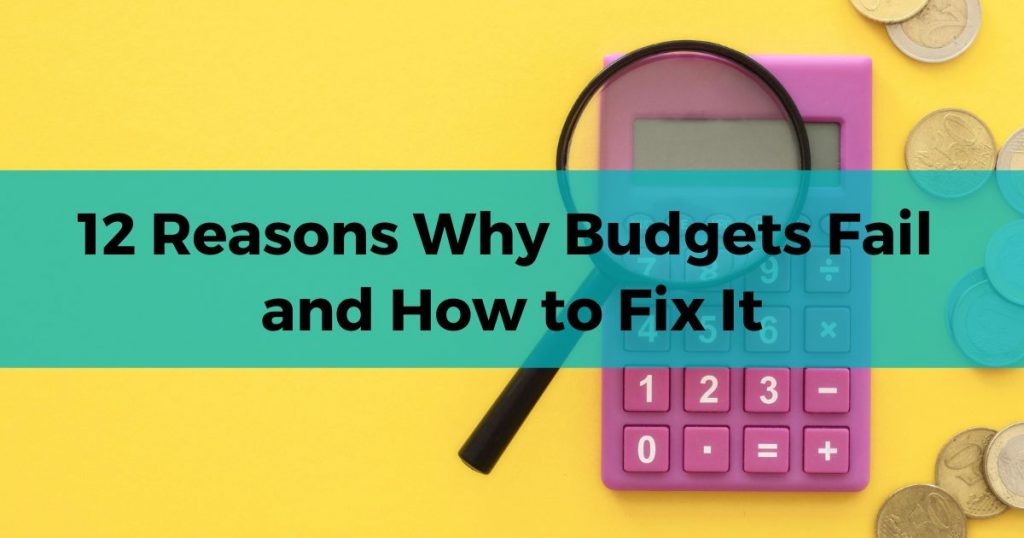
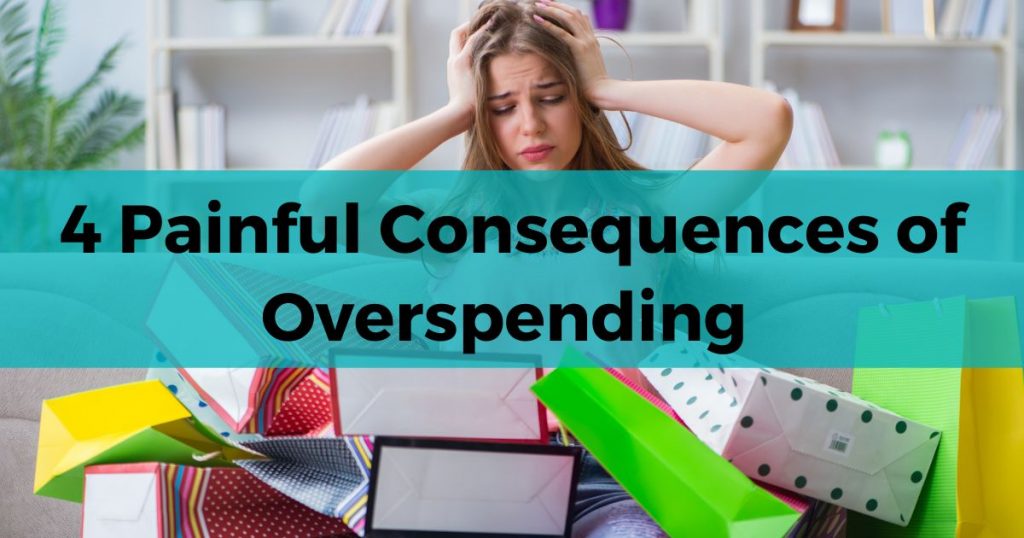

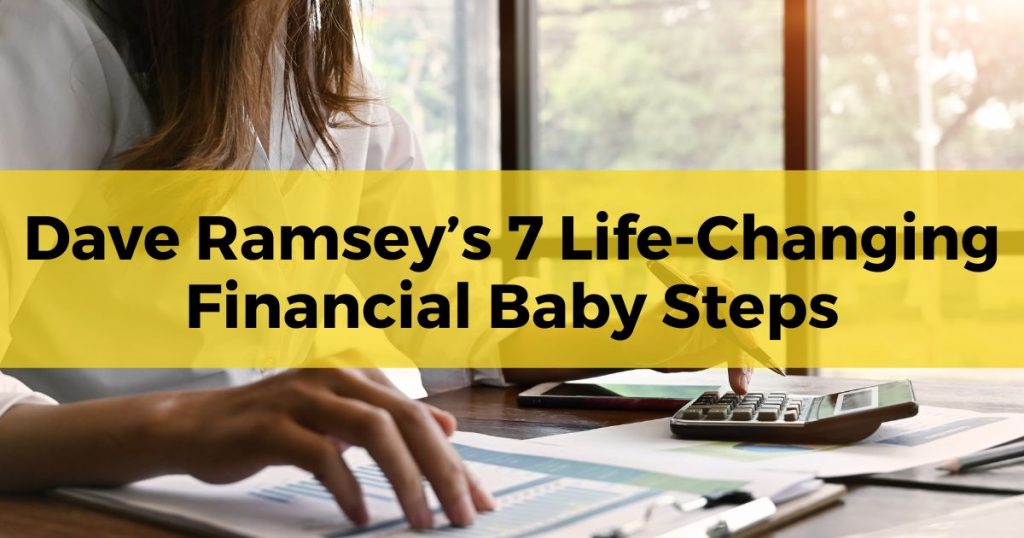

Bad borrowing habits, convenience spending instead of making traditional purchases, gambling, reasons why budgets don’t work for some.
Those are definitely budget busters! Thanks for sharing.
My husband and I have always been on the same page about budgeting so that has been a tremendous help. I do the day to day budgets and he does the long term retirement stuff. Works for us.
Budgeting is necessary but it is so hard to keep track of as it is not a fun task to do.
It takes time and effort to update your budget but it is definitely worth it as it can really help to cut your debt or boost your savings to achieve your goal.
Absolutely agree. Tracking is always the hard part for us too.